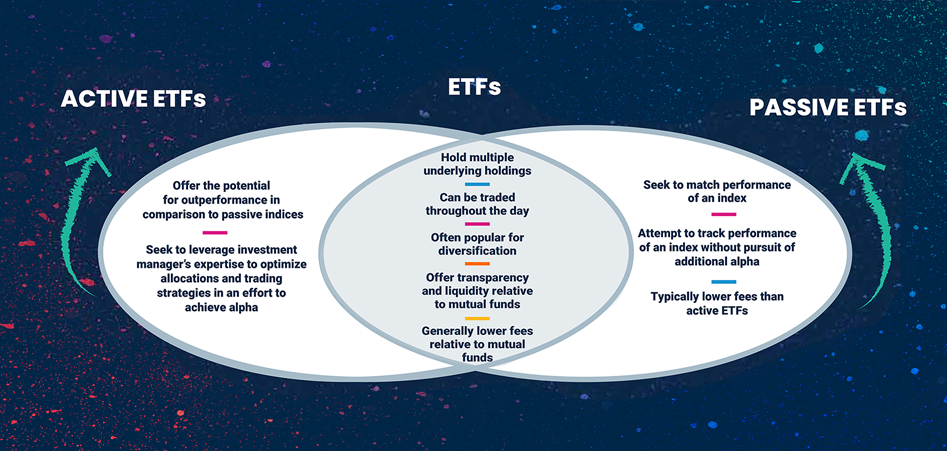Active and Passive ETFs: Evaluating Your Options

| Active ETFs | Passive ETFs | |
|---|---|---|
| Offer the potential for outperformance in comparison to passive indices | ✓ | |
| Seek to leverage investment manager’s expertise to optimize allocations and trading strategies in an effort to achieve alpha | ✓ | |
| Hold multiple underlying holdings | ✓ | ✓ |
| Can be traded throughout the day | ✓ | ✓ |
| Often popular for diversification | ✓ | ✓ |
| Offer transparency and liquidity relative to mutual funds | ✓ | ✓ |
| Generally lower fees relative to mutual funds | ✓ | ✓ |
| Seek to match performance of an index | ✓ | |
| Attempt to track performance of an index without pursuit of additional alpha | ✓ | |
| Typically lower fees than active ETFs | ✓ |
At Harbor Capital, we appreciate that actively managed ETFs afford the potential to access alpha, when backed by high-quality stewardship. Coupled with the added benefit of transparency, liquidity and low fees, we think active ETFs represent a compelling investment opportunity.
Check out Harbor’s lineup of active ETFs managed by hand-selected and vetted investment teams with differentiated approaches.
For additional information, visit www.harborcapital.com.
Important Information
Investors should carefully consider the investment objectives, risks, charges and expenses of a Harbor fund before investing. To obtain a summary prospectus or prospectus for this and other information, visit harborcapital.com or call 800-422-1050. Read it carefully before investing.
Investing involves risk, principal loss is possible. Unlike mutual funds, ETFs may trade at a premium or discount to their net asset value. Shares are bought and sold at market price not net asset value (NAV). Market price returns are based upon the closing composite market price and do not represent the returns you would receive if you traded shares at other times.
ETFs are subject to capital gains tax and taxation of dividend income. However, ETFs are structured in such a manner that taxes are generally minimized for the holder of the ETF.
An ETF manager accommodates investment inflows and outflows by creating or redeeming “creation units,” which are baskets of assets. As a result, the investor usually is not exposed to capital gains on any individual security in the underlying portfolio. However, capital gains tax may be incurred by the investor after the ETF is sold.
Diversification does not assure a profit or protect against loss in a declining market.
Alpha refers to excess returns earned on an investment above the benchmark return when adjusted for risk.
Foreside Fund Services, LLC is the Distributor of the Harbor ETFs.
3658800
